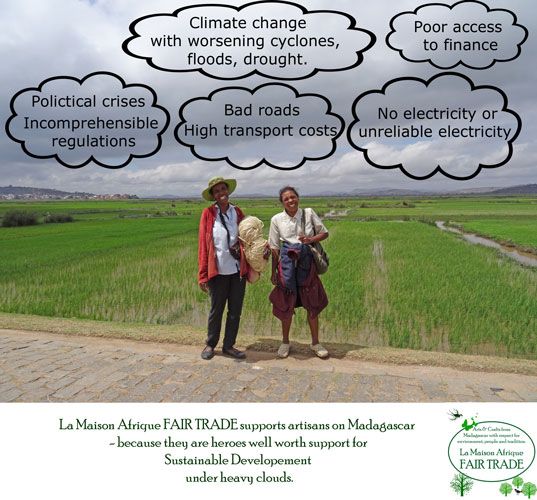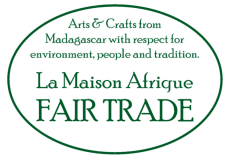Madagascar - opportunities for inclusive economic growth
World Bank analysis of obstacles and recommendations.

Madagascar - opportunities for inclusive economic growth.
On 7 December 2021, the World Bank Group presented "Country Private Sector Diagnostic: Creating Markets in Madagascar for Inclusive Growth". The report contains both a situation analysis and recommendations for Madagascar's economy.
The World Bank Group notes that the covid-19 crisis has taken a heavy toll on Madagascar's economy. The crisis has hit the vast majority (94%) working in the informal sector the hardest, but has also led to unemployment in the apparel industry and tourism. In addition, the rural population (which makes up 80% of the country's population) is increasingly affected by climate change - related natural disasters: droughts, cyclones, floods. 2021 is the fourth year of drought and increasingly severe famine in southern Madagascar. As a result of these crises, extreme poverty in Madagascar is estimated to have increased to 79.7% of the population by 2020.
The Government of Madagascar has prepared a crisis plan for the country's economic recovery "Plan Multisectoriel d'Urgence" (PMDU) and adjusted the strategic "Plan Emergency Madagascar" (PEM) to focus on areas that can benefit the economic recovery.
Saving lives and protecting vulnerable people, securing jobs, reducing financial pressure on companies and supporting sustainable growth in business is described as tasks for the Government of Madagascar - but for which support should be given by the World Bank Group, IMF, UN agencies etc international organizations.
The report's situation analysis addresses three obstacles to private sector participation in Madagascar's economic recovery:
1) Regulations: Unpredictable and abrupt changes in policy affecting business. Recurring political crises. Incomprehensible regulations.
2) Infrastructure: 2.1 Transport: Extremely poor and sparse road network, very little railway. Poor road connection from the capital to the country's only major port. Only two international airports. Poor connections within as well as between modes of transport. Natural disasters exacerbate inadequate maintenance of transport networks. High transport costs are also a result of high fuel prices. Road mortality is high (Madagascar is ranked 152 out of 175 countries in terms of road fatality).
2.2 Electricity: Low capacity, low coverage, unpredictable and often lengthy power outages. For companies that are connected to the electricity grid, recurring power outages and variations in the current mean damage in production (eg on equipment), delivery delays, lost sales.
Only 26% of the population has access to electricity of any kind, only 12% of the population is connected to the electricity grid. This means that Madagascar is among the least electrified countries in the world.
Electrification is of fundamental importance for the digital infrastructure that the country's development needs.
3) Access to finance: The banking system is underdeveloped, especially in rural areas where 80% of the population lives and usually subsist on self-sufficient agriculture. Widespread poverty is cited as an additional reason why only 18% of all households in Madagascar have access to a financial account (which is significantly less than the average for sub-Saharan Africa: 43%). Only 4% of Madagascar's residents over the age of 15 have borrowed from a bank / financial organization. For rural residents, the figure is even lower: 2%. Credit availability is among the lowest in sub-Saharan Africa.
Land ownership: Difficulties in obtaining ownership of land mean obstacles to investment due to the uncertainty it entails regarding the future value of the investment. It also makes it more difficult to get credit when this type of collateral is a required.
In the last part of the report, the World Bank Group takes a closer look at three areas for which growth potential is considered particularly good (agro-business, apparel, tourism) and provides recommendations for short-term (1 year) and medium-term (1-3 years) measures.
The full report (125 pages) "Country Private Sector Diagnostic: Creating Markets in Madagascar for Inclusive Growth" is available as a pdf.
The image above provides a summary of heavy clouds for Madagascar - including its ambitious artisans.
La Maison Afrique FAIR TRADE supports artisans, such as Madame Clarisse and Madame Ariette (on photo), who both live in a village in the Malagasy countryside where they plait hats and bags. Here they are on their way home to the village with the material they use in the production: sun-dried raffia palm leaves from the country's coastal regions. Manufacturing the bags and hats does not require electricity - only craftsmanship. The purchases of materials etc are financed by interest-free loans from La Maison Afrique FAIR TRADE. La Maison Afrique FAIR TRADE also arranges the export administration and transport of the goods. Support for artisans on Madagascar has continued since 1995.
Dear consumer, Support the artisans in Madagascar by buying their goods in the shops and church communities that make up La Maison Afrique FAIR TRADE resellers. – That’s an action that gives Madagascar opportunities for inclusive economic growth and Sustainable Development!
Are You interested in being a reseller of La Maison Afrique FAIR TRADE assortment? - Please find more information on this website. Welcome to register your company!

La Maison Afrique FAIR TRADE
-
+46 (0) 706017777
-
This email address is being protected from spambots. You need JavaScript enabled to view it. -
Trustorps Gård
311 65 Vessigebro
SVERIGE -
VAT/Orgnr: SE556526323201

